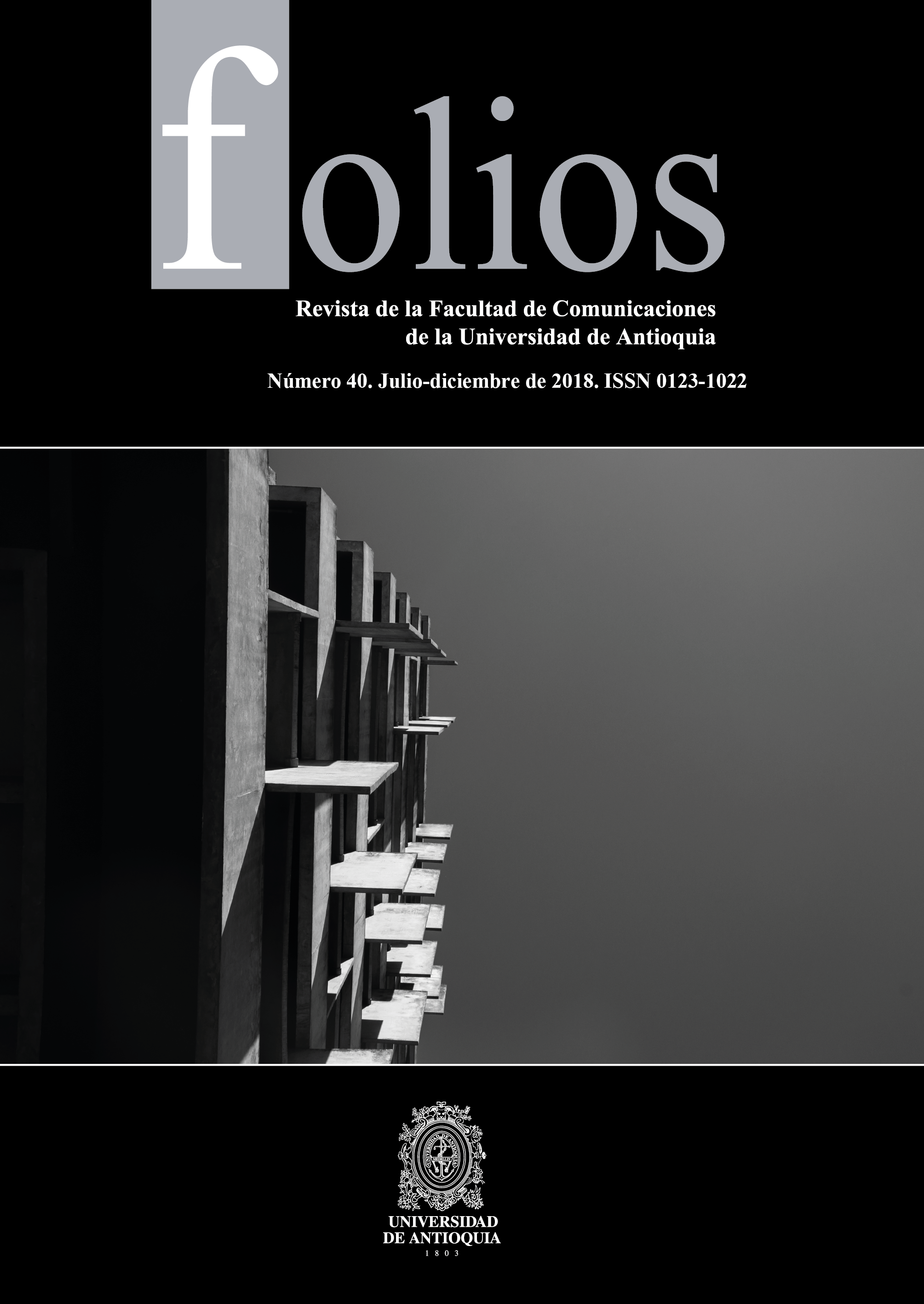O diálogo de abordagens para uma melhor compreensão investigativa
Keywords:
communication, comprehension as a method, mixed method, methodologyAbstract
The existence of multiple research paradigms, surrounded by quantitative and qualitative analysis techniques, allows some researchers to adopt their methodological preferences in a dichotomous way, sometimes ignoring other possibilities. However, the fact that there are differences in these research techniques does not prevent the existence of a harmonious dialogue between methods. Thus, the mixed method emerges as a possibility that unites different perspectives of analysis. In this essay, introductory concepts, applications and obstacles towards mixed methods application are presented. The mixed method represents another way to analyze and interpret data under different methodological perspectives and may improve the comprehension of communicational phenomena.
Downloads
References
ANNANSINGH, Fenio; KERRY, Howell. 2016. Using phenomenological constructivism to discuss a mixed method approach in information systems research. Electronic Journal of Business Research Methods, Sonning Common (Reino Unido), v. 14, n. 1, p. 39-49.
BAZELEY, Pat. 2003. Teaching mixed methods. Qualitative Research Journal, v. 3, p. 117-126.
BAZELEY, Pat. 2015. Mixed methods in management research: implications for the field. Electronic Journal of Business Research Methods, v.13, n. 1, p. 27-35.
BERGMAN, Caroline; DELLVE, Lotta; SKAGERT, Katrin. 2016. Exploring communication processes in workplace meetings: a mixed methods study in a Swedish healthcare organization. Work, v. 54, n. 3, p. 533-541.
BRANNEN, Julia. 1992. Combining qualitative and quantitative approaches: an overview. En: Mixing methods: qualitative and quantitative research. Aldershot: Ashgate, p. 3–37.
CARINS, Julia E.; RUNDLE-THIELE, Sharyn R.; FIDOCK, Justin J. T. 2016. Seeing through a glass onion: broadening and deepening formative research in social marketing through a mixed methods approach. Journal of Marketing Management, v. 32, n. 11-12, p. 1083-102.
CRESWELL, John W.; CLARK, Vicki L. P. 2011. Designing and conducting mixed methods research. London: Sage Publications..
DE LISLE, Jerome. 2011. The benefits and challenges of mixing methods and methodologies: lessons learnt from implementing qualitatively led mixed methods research designs in Trinidad and Tobago, Caribbean Curriculum, v. 18, p. 87-120.
DESCOMBE, Martyn. 2010. The good research guide: for small-scale social research projects. Maidenhead: McGraw-Hill International.
HALCOMB, Elizabeth J.; ANDREW, Sharon. 2009. Practical considerations for higher degree research students undertaking mixed methods projects. International Journal of Multiple Research Approaches, v. 3, n. 2, p. 153-162.
HERZ Marc; BRUNK, Katja. 2017. Conceptual Advances in Consumers’ Semantic and Episodic Brand Memories: A Mixed Methods Exploration. Psychology & Marketing, 34(1), 70-91.
HESSE-BIBER, Sharlene. 2015. The problems and prospects in the teaching of mixed methods research. International Journal of Social Research Methodology, v. 18, n. 5, p. 463-77.
JOHNSON, Burke; ONWUEGBUZIE, Anthony J. 2004. Mixed methods research: a research paradigma whose time has come. Educational Researcher, v. 33, n. 7, p. 14-26.
JOHNSON, Burke; ONWUEGBUZIE, Anthony J.; TURNER, Lisa A. 2007. Toward definition of mixed methods research. Journal of Mixed Methods Research, v. 1, n. 2, p. 112-133.
LEE, Jean S. K. 1992. Quantitative versus qualitative research methods: two approaches to organisation studies. Asia Pacific Journal of Management, v. 9, n. 1, p. 87-94.
MOLINA-AZORÍN, José F.; LÓPEZ-GAMERO, María D. 2016. Mixed methods studies in environmental management research: prevalence, purposes and designs. Business Strategy & the Environment, v. 25, n. 2, p. 134-48.
O’CATHAIN, Alicia; MURPHY, Elizabeth; NICHOLL, Jon. 2008. The quality of mixed methods studies in health services research. Journal of Health Services Research and Policy, v. 13, n. 2, p. 92-98.
PARK, Jeongeun; PARK, Minhye. 2016. Qualitative versus quantitative research methods: discovery or justification? Journal of Marketing Thought, v. 3, n. 1, p. 1-7.
POVEE, Kate; ROBERTS, Lynne D. 2015. Attitudes toward mixed methods research in psychology: the best of both worlds? International Journal of Social Research Methodology, v. 18, n. 1, p. 41-57.
SAUNDERS, Mark N. K.; LEWIS, Philip; THORNHILL, Adrian. 2012. Research methods for business students. 6 ed. Harlow: Pearson.
SHOCKLEY, Kristen M.; UREKSOY, Heather; RODOPMAN, Ozgun Burcu; POTEAT, Laura F.; DULLAGHAN, Timothy Ryan. 2016. Development of a new scale to measure subjective career success: a mixed-methods study. Journal of Organizational Behavior, v. 37, n. 1, p. 128-53.
STOCKMAN, Caroline. 2015. Achieving a doctorate through mixed methods research. Electronic Journal of Business Research Methods, v. 13, n. 2, p. 74-84.
STOEL, Dale M.; BALLOU, Brian; HEITGER, Dan L. 2017. The impact of quantitative versus qualitative risk reporting on risk professionals’ strategic and operational risk judgments. Accounting Horizons, v. 31, n. 4, p. 53-69.
TEDDLIE, Charles; TASHAKKORI, Abbas. 2009. Foundations of mixed methods research: integrating quantitative and qualitative approaches in the social and behavioral sciences. Los Angeles: Sage Publications.
TEDDLIE, Charles; JOHNSON, Burke. 2009. Methodological thought since the 20th century. En: Foundations of mixed methods research: integrating quantitative and qualitative approaches in the social and behavioral sciences. Thousand Oaks, CA: Sage Publications, p. 40-61.
VENKATESH, Viswanath; BROWN, Susan A.; SULLIVAN, Yulia W. 2016. Guidelines for conducting mixed-methods research: an extension and illustration. Journal of the Association for Information Systems, v. 17, n. 7, p. 435-95.
ZACHARIADIS, Markos; SCOTT, Susan; BARRETT, Michael. 2013. Methodological implications of critical realism for mixed-methods research. MIS Quarterly, v. 37, p. 855- 79.
ZAMBALDI, Felipe; COSTA, Francisco José; PONCHIO, Mateus Canniatti. 2014. Mensuração em Marketing: Estado atual, recomendações e desafios. Revista Brasileira de Marketing, 13(2).
Downloads
Published
How to Cite
Issue
Section
License
Copyright (c) 2019 Folios, revista de la Facultad de Comunicaciones

This work is licensed under a Creative Commons Attribution-NonCommercial-ShareAlike 4.0 International License.
Los documentos deberán ser inéditos y no podrán ser sometidos a consideración simultánea de otras publicaciones. Los textos enviados tampoco pueden estar publicados en un sito web y de ser así el autor, una vez aprobada su publicación en FOLIOS, debe comprometerse a retirar el artículo del sitio web donde sólo quedará el título, el resumen, las palabras clave y el hipervínculo de la revista. Para el caso de las traducciones la revista le exigirá una carta al traductor donde conste que el autor original y la editorial, donde ha sido publicada previamente, le han cedido los derechos de publicación del artículo y cuya consecución es exclusiva responsabilidad del traductor.










